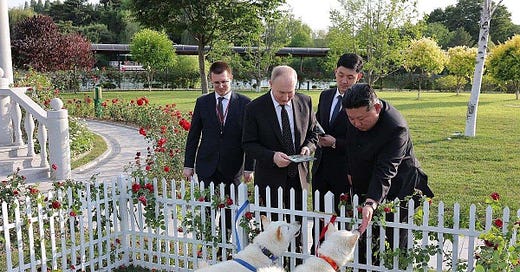In a Major Blow to the U.S., Putin Builds East Asian Front
Rampant U.S. militarism has once again pushed Russia, China, North Korea and Vietnam to join forces to stop U.S. plans to dominate East Asia and threaten the multipolar global order.
Russian President Vladimir Putin's unexpected and sudden visit this week to North Korea and Vietnam caught globalist liberal elites off-guard, leaving hapless officials in Washington, Brussels and Tokyo scrambling to respond.
When stopping in Vietnam on June 20, President Putin said he wanted to build a "reliable security architecture" in the Asia-Pacific region to defy U.S. hegemony, accusing the West of once again threatening to destabilize the region with plans to interfere in local disputes.
Putin's surprise tour of East Asia was most likely coordinated with Beijing, and it’s clear we’re witnessing a major watershed, the rise of an entente comprised of victims of Western aggression. From 1950 to 1975, U.S.-led invasions/ occupations of Vietnam and Korea killed millions and left tens of millions homeless. Moscow played a crucial role in helping North Korea and Vietnam to defeat the U.S. during the Cold War.
Also, from 1840 to 1948, China suffered from repeated European, U.S. and Japanese brutal invasions and occupations, especially deadly British efforts to promote opium use among the Chinese population.
In the early decades of the Cold War — in the 1950s and 1960s — the USSR, China, North Korea and Vietnam cooperated closely to combat U.S. influence. But that informal alliance began to fracture in the 1970s due to U.S. diplomacy led by Kissinger that turned China against the USSR, as well as China against Vietnam.
Putin’s current move is a major geopolitical victory for Russia, and a huge defeat for the White House, which has tried to isolate the President by falsifying a case against him at the so-called ‘International Criminal Court’ in the Hague.
Since the 1990s, Russia had been eager to join U.S. efforts to constrain North Korea’s nuclear weapons and missile program. Today, Moscow defiantly flexes its muscle in yet another region crucial to U.S. interests. Putin condemned international sanctions on North Korea, comparing them to the Nazi siege of Leningrad.
When news of Putin’s travel plans broke on June 17, western media began to fume on cue. The New York Times led the disinformation campaign, publishing on June 18 "In Need of Munitions, Putin to Visit North Korea". The article repeats the two-year old lie that Russia is running out of weapons and ammo, and must 'beg' North Korea for supplies to fight Ukraine.
Some western commentators claimed that the Kremlin's embrace of totalitarian North Korea is bad optics for Moscow. Such accusations, however, reveal just how little western ‘experts’ understand about Russia and North Korea.
Not a single western ‘expert’ could point out that both countries are neighbors; both share a small border. A central tenet of Putin’s foreign policy is friendship with all countries regardless of ideology; first and foremost with Russia’s neighbors. If certain neighbors, such as Ukraine, choose war, then they do so to their own detriment.
Putin also pledged to provide North Korea with sophisticated weapons as a way to strike back at the U.S. and South Korea for their massive support of Kiev’s totalitarian regime that terrorizes Russian cities with indiscriminate attacks against civilians.
“Westerners supply weapons to Ukraine and say that ‘we don’t control anything here and it doesn’t matter how they’re used,’” said President Putin. “We can also say that we delivered something to someone, and we have no control over anything. Let them think about that.”





. . Decency & fairness.. Knows No Boundaries....
I commend you, John, for your fine encapsulation of history in the Far East~the Orient, as many of us grew up calling it. History of the relations between nations gives us a framework to understand and analyze current diplomacy and actions between these storied nations that are so far from our shores. It IS best to take time to understand relations between Russia and her neighbors in the past before making uninformed commentary now to current events. I especially liked your explanation:
"A central tenet of Putin’s foreign policy is friendship with all countries regardless of ideology; first and foremost with Russia’s neighbors. If certain neighbors, such as Ukraine, choose war, then they do so to their own detriment."
Friendship regardless of ideology...how smart, how respectful, Russia is to its neighbors as it endeavors to secure peace.
Peace is what the civilians in western countries crave right now.